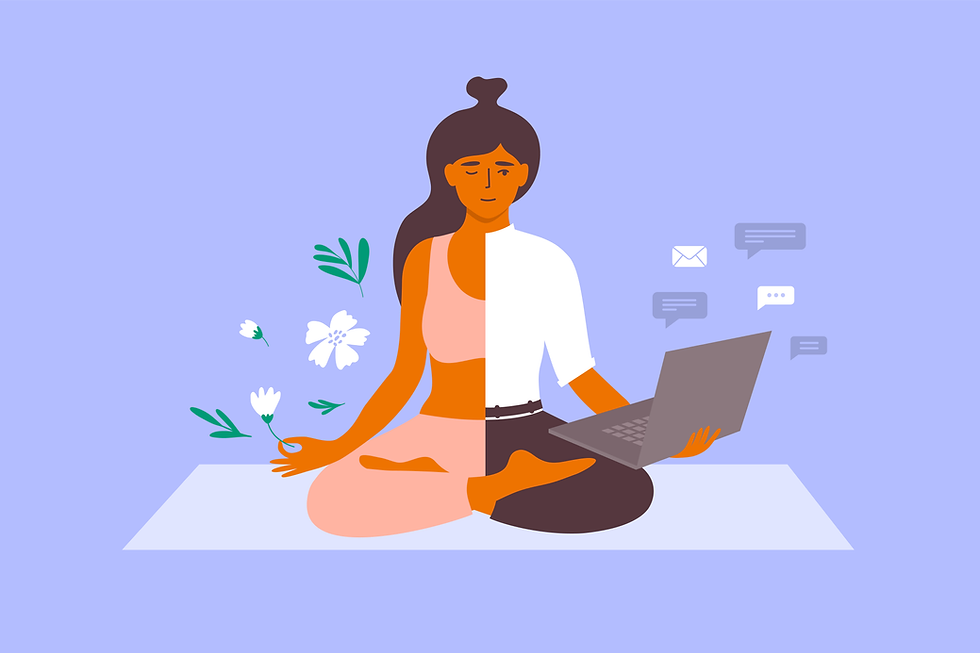The Biology Behind Stress: How it Hinders Success and What You Can Do About It
- Ananya
- Oct 20, 2023
- 4 min read

In a world that is faster paced than ever, stress is a common companion for many individuals, not a friendly one, but a companion nonetheless. Whether it's the demands of work, personal relationships, or daily challenges, unfortunately stress is inevitable and often inextricable to our daily lives. While it's nearly impossible to eliminate stress entirely, understanding the biology behind stress can empower us to manage it more effectively. Today, we dive into the science behind stress and explore healthy strategies that can help us handle the pressure that is so deeply embedded into our lives.
Dating back to our evolutionary past, stress is a natural physiological response. When our ancestors were faced with a threat, their bodies would trigger the “fight or flight” response, releasing hormones like adrenaline and cortisol. While their context may have been something like a wild animal, our body’s today have the same response that prepares us to either confront the threat head-on or flee from it. Although modern stressors might not involve physical danger, our bodies still respond in a similar way.
When we experience stress, the hypothalamus-pituitary-adrenal (HPA) axis is activated such that our hypothalamus signals the pituitary gland to release something called ACTH (adrenocorticotropic hormone) which prompts our adrenal glands to release cortisol. Cortisol is often referred to as the “stress hormone” for its capacity to read our bodies for action by bolstering our heart rate, sharpening our focus, and distributing/activating our bodies energy stores to where they are needed most.
While the stress response is essential for our survival in acute situations, the chronic stress that continues to plague our population today globally has been taking an obvious toll on our physical and mental well-being. As someone who is very easily stressed out, whether it’s the sound of someone chewing or a big examination, I’m far more familiar with the effects of stress than I want to be; with one of the worst of these effects being its counterproductive nature. I’ve found myself getting stressed out about getting stressed out, and it’s far more a fun cycle. Prolonged exposure to high levels of cortisol can lead to various health issues, including (but not limited to):
Impaired cognitive function: chronic stress can affect memory, concentration, and decision-making abilities, as cortisol interferes with the brain’s neurotransmitter balance
Weakened cognitive function: elevated cortisol levels suppress immune system function, making us more susceptible to infections and illnesses
Cardiovascular problems: persistent stress contributes to high blood pressure and an increased risk of heart disease by promoting inflammation and constricting blood vessels
Mental health disorders: chronic stress is linked to the development or exacerbation of mental health conditions such as anxiety and depression. Yes, being stressed can in fact make you more stressed - make of that what you will.
Alleviating yourself of stress is far easier said than done. Nobody wants to be stressed, but it seems inevitable unless you consciously inculcate strategies that are effective FOR YOU in managing your stress. By understanding the biological mechanisms and consequences of stress, we can align our management strategies to target the repercussions of stress and its stimuli/triggers in your lifestyle.
Physical activity: exercise triggers the release of endorphins, what are natural mood lifters. Regular physical activity can also help to regulate those dangerously high cortisol levels, reducing the impact of stress.
Mindfulness and meditation: I know this isn’t everyone’s cup of tea, particularly because it isn’t mine either, but it’s worth trying to see what your best fit is. Practices like meditation and deep breathing have been developed and studied for centuries for their activation of the body’s relaxation response, which ultimately counteracts the stress response and promotes what people tend to call an inner “sense of calm”.
Social support: neuroscience indicates that connecting with friends and family provides a biological sense of emotional support, releasing oxytocin - a hormone that promotes bonding and reduces stress. While they are a temporary escape, social connections are scientifically proven stress relievers!
Holistically healthier lifestyle: developing and practicing a healthy lifestyle is a highly multidimensional concept that involves a balanced diet, adequate sleep, the reduction of caffeine and alcohol intake, and physical activity. The amalgamation of these factors all contribute to a more resilient stress response. Certainly, for many people, 8 hours of sleep is far from sustainable and complimentary to their lifestyles; a lot of us are busier than we want to be. Even targeting one of these ‘healthy lifestyle’ components is far better than nothing at all.
Time management: as someone who obsessively makes to-do lists, calendar events, and blocks out time for tasks during my day, I’ve found that this behavior has made me not only far more organized but also a more efficient/productive worker. b y efficiently managing, planning, and delegating your tasks by setting up priorities, you can catch the stress stimuli before it even starts: preventing future you from being overwhelmed.
Unfortunately, today, stress is an inherent part of our lifestyles, but it's essential to manage it effectively to prevent its negative impact on our health. By understanding the biology behind stress and adopting strategies to regulate our body's stress response, we can lead more balanced and fulfilling lives. Remember that seeking professional help is crucial if stress becomes overwhelming and unmanageable, as trained professionals can provide guidance tailored to individual needs. Do what works for you!



Comments